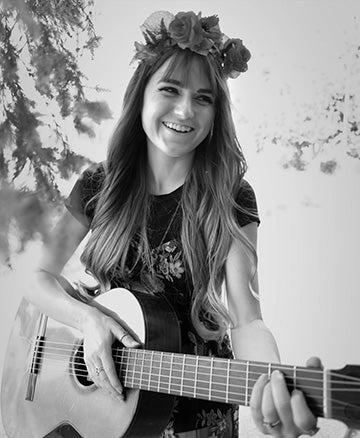XGuitars Blog
Tips For Improving Your Sight-Reading Skills
There really are no negative aspects of being a great sight-reader. In fact, this is probably one of the most valuable skill sets a musician can have! You’re efficient at learning new repertoire, you’re very hireable as a gig musician, and there’s nothing more satisfying than being able to sit down and just read through some music without having to stop and start all the time. The road to becoming a great sight reader can be a tedious, painful journey, and one I am admittedly still traveling! While the greatest tool for this process is...
5 Dollar Store Guitar Hacks
During my time as a music student in grad school (and if I’m being honest, for several years after…), my budget was about as thin as my high E string. My savings account was usually kept alive only by the five dollars I hadn’t yet borrowed from it, and my favorite weekly meal was black beans, cheese, and rice. Lucky for me I’ve got some pretty fantastic familial support systems who’ve helped me pursue my dreams, but I’ve still been that person checking my bank account before eating out at Chipotle to make sure my card won’t be declined.
So if you’re going through one of those ramen-noodle budget phases in your life, allow me to share some of the dollar store wisdom I learned as a music student!
So if you’re going through one of those ramen-noodle budget phases in your life, allow me to share some of the dollar store wisdom I learned as a music student!
Tips for a Healthy, Efficient Practice Session
A basic example of what works for me as a healthy practice outline. This is aimed at an intermediate player who is used to at least two hours of practice per day. If this does not describe you, just cut down the number of sessions into smaller chunks!

Interview with JiJi Kim
A Discussion about Gender Dynamics and Cultural Trends in the Classical Guitar Community
I’ve recently had the great pleasure of speaking with JiJi Kim, who just returned from a very busy season of touring and performing. One of her most recent projects has been the guitar concerto “Harp of Nerves” by Hilary Purrington. JiJi is also the Professor of Guitar at Arizona State University, where she teaches and performs a wide variety of styles. As a female guitarist myself, I jumped at the opportunity to get her opinion on gender dynamics and other cultural trends in the guitar community.
Could you talk to me a little bit about what got you into guitar? Did you start with classical or pop music? What got you into it?
“So it’s kind of both...
Could you talk to me a little bit about what got you into guitar? Did you start with classical or pop music? What got you into it?
“So it’s kind of both...
Are We in the Twilight Zone?
The Incredible yet Perplexing World of Guitar Composition
We’ve all been there. The frustrated temple rub, the perplexed glare at the score as you bring it closer and closer to your face, hoping that some magic fingering invented by an ancient, superior species with rubber hands will appear to you in a vision. “Are these the right notes? Surely not, I’d have to dislocate my finger to make that reach… I’m supposed to play all of these bar chords from the first fret to the 10th at what tempo?” These are thoughts that have certainly passed through my mind, particularly when I’m reading through a transcription, or music written by a composer who wasn’t/isn’t a guitarist. The truth is...
The Squeak
I can remember sitting in the high school practice rooms on a lunch break with one of my violinist friends. I was doing some work on Villa Lobos Prelude 2, desperately trying to prepare for my upcoming college auditions. I reached the B section, fraught with full bars and shifts spanning the entire neck of the guitar. I’d started to think I was finally getting the hang of things, when I see a look of complete disgust from my friend in the corner. I realized that I hadn’t...
On Wednesdays We Play Classical
A glimpse into the benefits of more genre crossover in the guitar world
I can still remember playing one of my first outdoor gigs, and feeling super prepared with a neat binder full of sheet music with alternate repeats and endings written in, queues for the transition into dinner, etc. Everything was going so well, when Mother Nature decided that it was a good day for testing my musicianship. With one particularly robust gust of wind, my music manually “rewound” back to halfway through my first piece of music. I can remember trying so hard to mask my internal panic while working hard to stumble through the imaginary ending of my piece and remain in the same key, wrap up my melody with at least some level of interest and musicality, and to not to alert people to the fact that I was absolutely terrified of being put in a situation without sheet music in front of me.
One Hand to Rule Them All
A glimpse into the fallacy of the left-handed disadvantage, from the perspective of another Southpaw
As a left-handed person, I am familiar with all of the inconveniences of living in a right-handed world. The discomfort of doing basic grade-school crafts involving scissors, being the oddball at tennis camp that's hazardous to stand next to during demonstrations if you're right-handed, and having a perpetual pen stain down the side of your hand after every essay written at school are all constant struggles. When I was young and starting to learn how to play classical guitar, I was asked by my teacher if I wanted to play a left-handed guitar...
To Have And To Cling To
Almost every guitarist has had that moment of realization when they understand that whatever they’re doing with posture, it isn’t working. Maybe you start with a footstool, and after years of back pain and hearing your joints pop every time you stand up, you start looking for a new support system. Perhaps you even start with an ErgoPlay, and after that first suction cup fails to deliver, and you feel your instrument start to tumble outof your hands, you re-evaluate. This is not a new problem; the ideal way to support our instrument has plagued guitarists for years. From Sor’s use of a table to Aguado’s tripod contraption, guitarists have been searching for the ideal solution long before the invention
of many modern supports. With new technology and ideas, we have certainly gained...
of many modern supports. With new technology and ideas, we have certainly gained...
To Be Amplified Or To Not Be Amplified?
That is the question that so many classical guitarists struggle with.
Many of us who have performed with any kind of chamber group are familiar with the issue of producing adequate volume with a classical guitar. From crossing out every dynamic marking other than forte or fortissimo to wearing down our nails to jagged little stubs attempting to coax every last decibel from the strings, we go to such great lengths to come close to matching our colleagues in volume. Even playing with one other bowed instrument can pose balance issues, so it’s almost always assumed that the guitarist should be amplified in groups that are larger in number. However...
We Can Have Our Cake and Eat It Too
The various ways guitar builders make our instrument so personal
Choosing a guitar is a unique, fun, and extremely personal experience. While almost any instrument has different customizations that can be made and different sound qualities that can be achieved by the maker, virtually any part of the guitar can be changed according to the player or builder’s desire. Whether it’s choosing a custom rosette, tuners, particular woods for the back and sides, type of polish, or any of the myriad of personal touches, this freedom of style has appealed to instrument builders for centuries...

Kathryn Lambert Bio
Kathryn Lambert began her classical guitar studies at the age of 6 under the direction of Polly Maynard-Watson of the Childbloom Guitar Program in Denton, Texas. She attended the Houston Classical Minds Festival at the age of 14, competed in an open level competition, participated in a masterclass with Randall Avers, and received private lessons with Isaac Bustos and...
